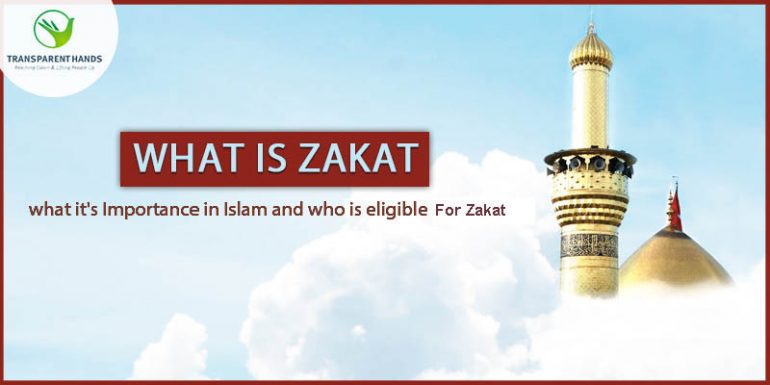What is Zakat? Importance and Eligiblity for Zakat

There’s nothing more, nothing better than to spend each day of life in the servitude of humanity, and at some point of time, when we’ll look at ourselves in the mirror we feel content at heart, knowing we have fulfilled our responsibilities towards society and its people. What is Zakat and What is its importance in Islam and Who is Eligible for Zakat?
The existence of countless starving, poor, hungry, and destitute Muslims and non-Muslims in the world points to the need that we must stand up and put into practice one of the essential teachings of Islam which is charity. There are two ways of spreading light in our communities: to be the candle or the mirror that reflects it. A healthy social life is found only when each soul and each one living here contributes to eradicating human miseries.
Rich Muslims may not realize how their wealth could strengthen numerous communities. Giving charity correctly is essential for the well-being of the needy as well as the ultimate happiness of the wealthy.
What is Zakat?
Zakat is the concept of obligatory charity in Islam. It’s how we give back, out of our own wealth, to those less fortunate. In a world of social and economic inequality, it is vital for Muslims to uphold the tradition of Zakat. Our Zakat can enable us to uplift lives, families, and communities.
8 Kinds of People Who Can Accept Zakat
The Prophet said: “The upper hand is better than the lower hand (he who gives is better than him who takes). One should start giving first to his dependents. And the best object of charity is that which is given by a wealthy person (from the money left after his expenses). And whoever abstains from asking others for some financial help, Allah will give him and save him from asking others, Allah will make him self-sufficient.” (Al-Bukhari)
Importance of Zakat:
With a large or small lump in our hands, Muslims through the teachings of Islam can donate their excess wealth to ending poverty. While an individual’s Zakat might not solve the humanitarian crisis around us but the Zakat of thousands of rich and wealthy can.
When we give Zakat it shows that we are obeying the Almighty. Helping a person in need acknowledges that everything comes from the Almighty on loan and that we do not really own anything ourselves. Since we cannot take anything with us when we die, we should not cling to it.
Giving Zakat also shows that we are acknowledging that whether we are rich or poor it’s the Almighty’s will so we should help those who are poor. Zakat helps us to learn self-discipline as we are freeing ourselves from the love of possessions, greed, and the love of money. Giving Zakat frees oneself from the love of oneself allowing us to behave honestly.
Zakat fastens together the individuals since it is a kind of social solidarity. The rich can develop feelings of love, compassion, and mercy towards the poor. The poor can develop feelings of obedience, and respect, and work carefully towards the rich. The feelings of jealousy, enmity, and envy can be soothed and even eliminated through the regular act of giving.
The following is stated in the Quran: “Allah has bestowed His gifts of sustenance more freely on some of you than on others.” (an-Nahl, 71)
Who Is Eligible to Pay It Off:
However, Zakat does not refer to charitable gifts given out of kindness or generosity, but to the systematic giving of 2.5% of one’s wealth each year to benefit the poor. The 2.5% rate only applies to cash, gold and silver, and commercial items. There are other rates for farm and mining produce, and for animals. For people to pay Zakat they must meet the following criteria:
- The person should be an adult, sane, and free.
- They must possess a certain minimum amount of extra wealth (called Nisab), fully owned by them in excess of personal use (such as clothing, food, shelter, household furniture, utensils, cars, etc).
- They should have had this minimum amount of possession for a complete lunar year.
- The wealth should be of a productive nature, from which they can derive profit or benefit such as merchandise for business, gold, silver, livestock, etc.
- The minimum amount (or Nisab) should not be owed to someone, i.e., it should be free from debt.
Conclusion
Let us not be satisfied with just giving once a year or only during special occasions. Giving Zakat once a year is not enough. The immense suffering of the needy or the ones in terrible crisis demands our immediate attention so after we have given Zakat, we can still donate as Sadaqah all year round and whenever it’s possible to make sure that the needy and the most vulnerable people get our affection and love.
We must not give Zakat or Sadaqah only for the sake of giving. Through Zakat or Sadaqah respect, love and devotion come in. So we should try to do it as beautifully as possible. The Zakat or Sadaqah serves as a way to bring justice, balance, and kindness to every society and community. It is our hope that the Muslim community fulfills its charitable duty correctly and does its part to eliminate poverty in communities everywhere. So, spread your love everywhere you go.










Leave Your Comments